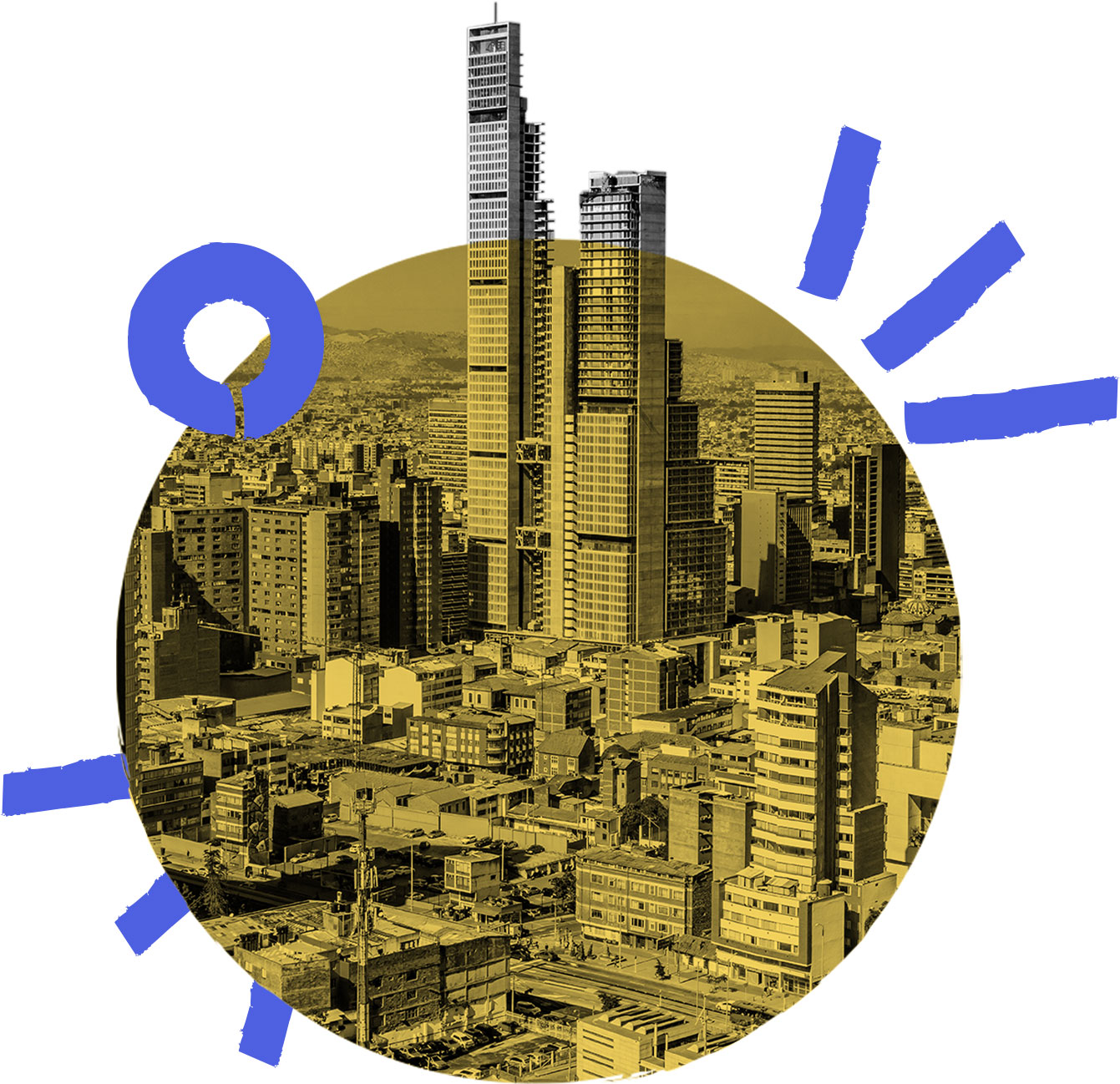Welcome to Colombia
Bogotá is the capital of and largest city in Colombia. It is a place of convergence for people from all around the country and is therefore diverse and multicultural. Within this city, the past and present come together.
The city is also very green thanks to its parks and the hills that extend along its eastern boundary, dwarfed by their two highest points, Monserrate and Guadalupe. The landscape that the people of Bogotá enjoy daily—the sea of green that makes up the Andes mountain range, rising up in the east—would be nearly impossible to find in any other large city.
Thanks to a fusion of the past and present, Bogotá is an ideal location with history, entertainment, delicious cuisine, culture, business, and much more. In 2021, the new IPPF Americas and the Caribbean Regional Office opened in Bogotá.
Bogotá is the location of, IPPF Member Association, Profamilia Colombia's Headquarters. Profamilia is a private non-profit organization that, for more than five decades, has been promoting and defending the exercise of sexual and reproductive rights of the population in Colombia so that they can make free, safe and informed decisions about their sexuality, without discrimination, coercion or violence. The organization has more than 40 clinics throughout Colombia, making it the private health institution with the greatest coverage in the country and the second largest in all developing countries. Every year, Profamilia provides more than 2,900,000 services and provides care to more than 450,000 people, most of them in vulnerable conditions.

Bogotá is the melting pot of Colombia. Here, all the cultures from different regions of the country have a place, from the cuisine of the Coffee Triangle to the exhilaration and joy of the Caribbean, or the artisanal heritage of Boyacá and the Valle de Cauca Festival. Bogotá brings together the best of Colombia.

Video title
Watch with English subtitles
Watch with French subtitles
Watch with Arabic subtitles
Recommendations
- The weather and temperature that you can find in Bogota has a lot to do with the strategic location of the capital of Colombia in the territory. Being a city surrounded by mountains, its weather or temperature ranges between 8 and 20 degrees Celsius (46.4 to 68.0°F.) Autumn clothes are perfect to enjoy the weather in Bogota. Of course, always carry an umbrella with you, since rains are frequent in the capital.
- Keep in mind that Bogota has an impressive altitude of 8,530 feet above sea level. This could cause altitude sickness, try to make a habit out of drinking a lot of water, eating well, and resting properly.
- To make sure you don't lose any time, remember that Bogotá is located in the GMT-5 time zone, and doesn't adjust its time in the spring and fall as many other countries.
- There are many ways to get to Bogota. Because the capital of Colombia is in the center of the Colombian territory, which is, in turn, the gateway to the South American continent, many flights include a stopover at Bogota's airport El Dorado. Some of the airlines that arrive to the city are Iberia, Avianca, Air France, Air Canada, Lufthansa, British Airways, and American Airlines. Another way to get to the capital of Colombia if you are on the continent is by bus from countries like Brazil, Ecuador, Chile, Bolivia, Venezuela, and Peru.
- If you take a taxi, it's best to order one over the phone or using a mobile app from a known company like Easy Taxi or Taxis Libres. Apps like Beat, Uber, and Cabify are also used in Bogotá – often taxis booked via apps will prefer for you to sit in the front seat next to the driver.


Staying Out of Trouble: Activities that are Criminalised in Colombia
While it's rare for a traveller in Colombia to commit such a serious crime, visitors can sometimes end up on the wrong side of the law. The good news is that it’s not hard to avoid getting arrested in Colombia: simply steer clear of the following, and you can enjoy your time here in peace.
Buying Drugs
Colombia's reputation for cocaine production has sadly turned it into a popular place for travellers to attempt to buy and consume the drug. There seems to be an attitude among some visitors that buying cocaine in Colombia is somehow more acceptable than elsewhere, and consequently it is all too common for travellers to find out the hard way that this is simply not the case. While possession of very small amounts of cocaine carries no penalty, the punishment for being caught buying or consuming it can be swift and strong, and those caught can easily end up in jail.
Drug Trafficking
It's bad enough being caught buying or consuming drugs, but the penalties for being involved in drug trafficking are extremely severe. With a possible jail sentence of up to 25 years it's simply not worth the risk. It can also be a common tactic for drug cartels to use people as 'sacrificial lambs' in order to distract authorities from other larger shipments leaving the country, so be extremely vigilant and cautious, and never accept packages or bags from anyone.
Bribing a Police Officer
It's a common assumption for travellers in Colombia that you can get away with almost any crime by simply quietly offering a fistful of banknotes to the arresting officer. But this is not the case, Colombia is currently taking steps to crack down on corruption, and attempting to bribe a member of the police or armed forces is a crime. It is also illegal for police to solicit bribes so consider reporting any officer who tries to elicit money from you.
Animal Trafficking
As one of the worlds most biodiverse countries, Colombia faces a massive battle against animal trafficking. From tiny fish larvae hidden in ink pens to giant shipments of crocodiles, iguanas, and monkeys, animal trafficking represents a huge threat to Colombia’s natural diversity. With a maximum punishment of between 48 and 108 months’ jail time, trading in or illegally possessing wildlife is a sure fire way to get arrested.
Child Sexual Exploitation
Although sex work in Colombia is legal in designated “tolerance zones,” the country’s struggles with war and internal displacement have left minors vulnerable. Due to the sad trend towards so-called "child sex tourists," the Colombian government has strengthened its efforts to stamp out the practice, with warning posters commonly seen in hotels and hostels, and the imposition of heavy jail sentences. Thankfully, the overwhelming majority of travellers would never dream of engaging in this activity; however, it is also important to be vigilant and to report any signs of child exploitation to the police.
Facilitating Sexual Tourism
While sex work is be legal in Colombia, managing or organizing sexual tourism is not: Medellin recently began a crackdown, with the arrest of a foreign sex-tourism provider. The law provides penalties of three to eight years’ imprisonment for facilitating these activities. Youth Representatives attending the General Assembly may be questioned to ensure they are not victims of trafficking at immigration both entering and leaving Bogotá, so it is best to be prepared with your answers and papers to prove your activities in Bogotá.
Dealing in Antiquities
With a number of UNESCO-certified world heritage sites such as San Agustin and Tierradentro, Colombia takes the safeguarding of its archaeological patrimony incredibly seriously. There are many laws and decrees forbidding selling, purchasing, or removing antiquities from the country. While this might not seem like an activity that most travellers would engage in, it’s easier than you might think to become embroiled in this illegal trade: travellers to San Agustin and Tierradentro have often reported being offered antiquities by unscrupulous tour guides. The punishment for possessing these items might not be long jail terms, but avoid the risk and say no.
Drinking in Public
The laws regarding public alcohol consumption in Colombia can often be confusing for travellers: it is common to see people drinking beer in public in certain squares in large cities, often in front of the police. However, strictly speaking, drinking in public is illegal, and the decision about whether to enforce the law is entirely at the discretion of the officers in question. You are unlikely to be arrested or serve any jail time if the police choose to make an example of you, but public drinking can carry a hefty fine, so it’s advisable to err on the side of caution and not take any chances.

Overstaying your Visa
Travellers to Colombia are given a set number of days they are entitled to stay on a tourist visa, issued as a passport stamp upon arrival in the country. After this period, it is possible to visit a migration office and extend your visa by a further 90 days for a small fee. Once you exceed the time limit on your visa, you’ll need to leave or get a work visa.


